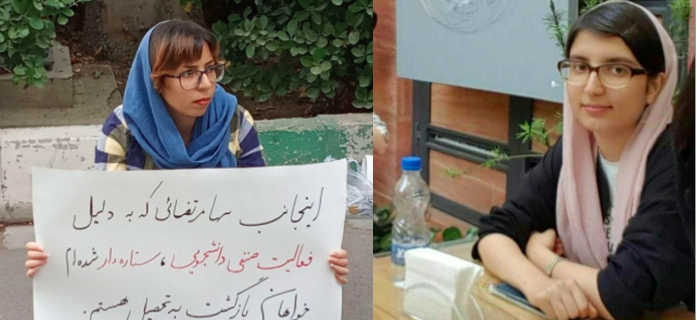CHRI – Two imprisoned student activists continue to be persecuted for peacefully protesting unjust policies and practices in Iran, including so-called “virginity tests.”

Charged with “assembly and collusion against national security” for peacefully participating in protests, Saha Mortezaei must now serve six years in prison after her sentence was upheld by Branch 54 of the Appeals Court in Tehran.
“For a while, the security agents had been warning Saha about her sit-in protests [starting in October 2019] against being denied enrollment in the University of Tehran’s doctorate program in political science and international relations,” a source with detailed knowledge of her case told the Center for Human Rights in Iran (CHRI) on February 10, 2021.
Speaking on condition of anonymity for fear of reprisals for speaking publicly, the source added, “When her protests continued into the November 2019 mass demonstrations and riots flared up at the University of Tehran, Saha was arrested on the night of November 17, 2019, at her student dormitory.”
The student activist was put on trial for the trumped-up charge of acting against national security for attending protests.
A former secretary of the University Trade Unions’ Council of Iran (UTUCI) at the University of Tehran, Mortezaei was held in Evin Prison’s Ward 2-A, which is under the control of the Islamic Revolutionary Guard Corps’ (IRGC) Intelligence Organization, and later transferred to Gharchak Prison in Varamin, south of the capital.
After going on a hunger strike for 22 days, she was released on bail set at 500 million tomans ($118,603 USD), on January 22, 2020.
Previously, in September 2018, Branch 26 of the Revolutionary Court in Tehran had sentenced Mortezaei to six years in prison and banned her from political activities for two years for peacefully taking part in anti-government protests in December 2017. On appeal, the sentence was reduced to one year in prison.
In the latest case, Mortezaei was put on trial with two other student activists—Kamyar Zoghi and Marjan Eshaghi—at Branch 15 of the Revolutionary Court presided over by the notorious hardline Judge Abolqasem Salavati on November 9, 2020.
All three were charged with “assembly and collusion against national security” but Zoghi and Eshaghi were issued a lighter sentence of one-year in prison.
“Saha Mortezaei received a harsher sentence because she had prior conviction and arrests… in connection with protests in 2017 and 2020 and she had been disciplined and banned by the university and because she protested for a long time,” the source with knowledge about her case told CHRI.
Meanwhile, a source in Iran confirmed that another imprisoned student activist, Parisa Rafiei, has been charged for complaining about a so-called “virginity test” and sentenced to 15 months in prison—after a judge initially acquitted her.
In a global call to eliminate violence against women and girls, the UN Human Rights Office, UN Women, and the World Health Organization called in October 2018 for an end to virginity tests, described as a “medically unnecessary, and often times painful, humiliating and traumatic practice.”
In their statement, the UN agencies also explained that the practice has “no scientific or clinical basis” and that “there is no examination that can prove a girl or woman has had sex.”
“The charge against Rafiei was rejected in the preliminary trial but then the IRGC’s Sarallah Headquarters pressured Branch 36 of the Appeals Court to continue prosecuting Rafiei, and the court subsequently sentenced her to 15 months in prison,” the source with knowledge of the case told CHRI on condition of anonymity for security reasons.
Since June 2020, Rafiei has been serving a seven-year sentence for the charges of “assembly and collusion against national security,” “propaganda against the state” and “disrupting public order.” She will be eligible for release after serving five years.
The new 15-month sentence is punishment for a letter Rafiei wrote in May 2019 revealing details of how she was pressured to take a “virginity test” while in state custody.
“In a totally unlawful action during my detention, my interrogator with the approval of the case investigator sent me to the medical examiner’s office on Behesht St. for a virginity test but I stood firm and despite threats and lots of pressure, they did not succeed,” she wrote.
“I insisted on lodging a complaint against this illegal request [of a virginity test] several times but the authorities refused and kept it quiet,” she added.
Read this article in Persian.
 Shabtabnews In this dark night, I have lost my way – Arise from a corner, oh you the star of guidance.
Shabtabnews In this dark night, I have lost my way – Arise from a corner, oh you the star of guidance.


